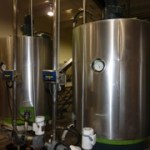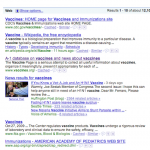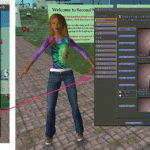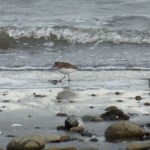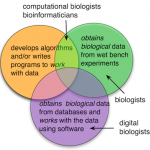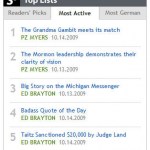Science Culture
Have you ever wondered if creationism was intelligently designed?
Most of my colleagues tend to dismiss creationism as generally nutty and not worth bothering about. But, every now and then, we did get the odd situation with a few students who disagree or state legislatures that get a little confused about the definition of science.
This video lecture is a bit long, but definitely interesting.
Jonathan Eisen (@phylogenomics) shared this wonderful Lady Gaga lab spoof on Twitter the other day. It rocks.
And, it makes me wonder if my pals who've been thinking about getting students interested in careers by having scientists talk on camera might be going at this the wrong way. Sure, videos of scientists talking are totally fascinating (yawn..) and...
Oh right, where was I?
Well, here's the thing. If you want to get kids interested in something, you have to use something that interests them. Your strategy isn't going to work unless the kids find it intriguing enough to go watch…
Theo chocolate is situated in a neighborhood called Fremont, in the city of Seattle, in the former Redhook brewery. I used to consult for Redhook in my microbiology days, when I had access to a -80°C freezer and a proper microscope, so the building has a comfortable feel and some pleasant memories.
These days the bar is gone and the aromas are more like roasting coffee than brewing beer. Most of machinery, though, is surprisingly similar. The equipment is very much the same as the equipment you'd find in many kinds of biotech manufacturing facilities. There are giant scales, fermenters,…
I am pleased that activity on the Island of Doubt has increased in recent months. I manage to squeeze in a hour four or five days a week to write about what I think is the most serious public policy challenge of our time, and make what modest contribution I can to the debate, and I wish I could do more.
Indeed, I wish I could devote my entire working day to his blog. But I can't. I have to make a living and income for this blog covers little more than my DSL bill. So monitoring the comments on a hourly basis is out of the question. Until recently, that hasn't been a big problem. But the…
One of the many interesting sessions I attended at ScienceOnline 2010 (#scio10) covered the questions of trust and critical thinking.
Sitting in the audience, I couldn't help but think of a mash-up (like on Glee!) between this session the one on Fact checking.
Granted, I know I'm a nitpicky scientist with an obsession for minutiae but I kept hearing statements during the session that I either wondered about or I knew were completely wrong.
Here's our first mashup tweet from docfreeride from David Dobbs:
Writing 1st book, description of bit character in mid/late 60s... after book came…
Have you ever wanted to volunteer your talents and help with fun projects like these:
* Refurbish computers for schools
* Teach students how to use popular software or online services
* Build a database for a nonprofit
* Help out in your school's computer lab
* Become an online mentor for students across the country
In the spirit of MLK day, Serve.gov is calling on educators and tech people to participate in connecting schools and non-profits with tech needs to those who can help. You can use the widget below to find projects in your area.
To quote Serve.gov, and Dr. King…
ScienceOnline 2010 was one of the most amazing meetings I've attended in a long time and it's going to take some time to process it all, but in the mean time, it seems other bloggers (phylogenomics, CogSci, and Ed) have started one of those meme things and so, here goes.
At ScienceOnline 2010, I learned:
More than I ever wanted to know about the intimate details of duck sex. courtesy of Carl Zimmer!
Likewise for dolphins. courtesy of Kevin Zelnio!
Why the instantiation of Baked Alaska will never be as good as the Platonic Ideal. (courtesy of Dr. Freeride)
What DNA Jesus would…
Okay, I'll grant that visiting Second Life can seem a bit uncomfortable, especially at first, but it does open some new doors and present an alternative to travel.
In flu season, virtual visits could be the next best thing to being there. (Yikes, that sounds like an ad. No more yahoo news for me!)
Here's where you can attend ScienceOnline 2010 in Second Life (http://slurl.com/secondlife/Research%20Triangle%20Park/128/129/25).
The next excuse might be that you don't know how to use Second Life or what to do. Never fear. That's a solvable problem.
I have a primer on attending a…
Is there a place for citizen scientists in the world of digital biology?
Many of the citizen science projects that I've been reading about have a common structure. There's a University lab at the top, outreach educators in the middle, and a group of citizens out in the field collecting data.
After the data are collected, they end up in a database somewhere and the University researchers analyze them and write papers. At least that's my impression so far.
It seems to me, that with all kinds of databases out there, on-line, there should be plenty of opportunity for both citizens and student…
Do citizen science efforts ever go beyond "feel good" contributions? Do the data get published in peer-reviewed journals?
In an earlier post, I started a list of citizen science projects that allow students to make a contribution. Many commentors are graciously adding to that list and I thank you all! I'm glad to learn there are so many interesting projects and ways for people to get involved. Science is so empowering!
My question today concerns things like outcomes and deliverables. We'd like to assume that good things are coming from citizen science because people are involved, but I…
Next Saturday afternoon, at ScienceOnline2010, the science goddess, the chemspider, and I will be presenting a workshop on getting students involved in citizen science.
In preparation, I'm compiling a set of links to projects that involve students in citizen science. If you know of any good citizen science efforts, please share them in the comments.
Here we go!
Before I start listing links, I am limiting this list to projects that allow both students and citizen scientists to participate. I know of plenty of student projects, where students can isolate phage and annotate their genomes or…
"What's in a name? that which we call a rose
By any other name would smell as sweet"
- Juliet, from Romeo and Juliet by William Shakespeare
I realized from the comments on my previous post and from Mike's post that more explanations were in order.
It seems we have two topics - why do we need a new name at all? and why the current names (biologist, computational biologist, bioinformatician, etc.) don't work. What really distinguishes a digital biologist from a regular, garden variety biologist? Why isn't a digital biologist a computational biologist?
So, I brought along two "show and tell…
If you're in Seattle, Dr. Bruce Alberts will be talking tomorrow night (Jan 5th) at the Seattle Aquarium on science education and the role that scientists play.
There are also some really interesting talks at a day-long workshop, Wednesday (Jan 6th) at the UW South Campus Center.
The details and registration info are below:
~ ~ ~ ~ ~ ~ ~ ~ ~ ~ ~ ~ ~ ~ ~ ~ ~ ~ ~ ~ ~ ~ ~ ~ ~ ~ ~ ~ ~ ~ ~ ~ ~ ~ ~ ~ ~ ~ ~ ~ ~ ~ ~ ~ ~
Tuesday:
COSEE Ocean Learning Communities & Washington SeaGrant Present
Redefining Science Education and the
Roles that Scientists Play in Society
Dr. Bruce Alberts
Tuesday,…
What do you call a biologist who uses bioinformatics tools to do research, but doesn't program?
You don't know?
Neither does anyone else.
The names we use
People who practice biology are known by many names, so many, that the number of names almost reflects the diversity of biology itself.
Sometimes we describe biologists by the subject they study. Thus, we have biologists from anatomists to zoologists, and everything in between: addiction researchers, chronobiologists, epidemiologists, immunologists, microbiologists, neuroscientists, pharmacologists, physiologists, plant biologists,…
Not from me, but from Daniel Loxton of Skepticblog, who has been doing some thinking about what skeptics can learn from James Randi's missteps on climate science. His advice is bound to rankle the feathers of those who are innately distrustful of everyone and everything associated with "conventional wisdom," "expert consensus," or "recognized experts." But for the those who fancy themselves dragon-slayers of pseudoscience, it serves as a valuable reality check.
To begin, Loxton reminds us that "If we're serious about our science-based epistemology, we must be prepared to consistently defer to…
William "Stoat" Connolley draws our attention to a couple of essays by Mike Hulme of the University of East Anglia climate team on the role of climatologists -- and scientists in general -- in the policy-making process. I have to agree with William, it's not exactly clear just what Hulme is getting at. Some excellent points are raised, though, and the essays are worthwhile fodder for thought as the Copenhagen conference begins.
Hulme may be a fine scientist, indeed one of the best, but I have trouble following his line of reasoning on this subject in both the Wall Street Journal and the BBC…
Rarely does a blogging day pass that I don't stumble upon some post or comment or email that champions the value of skepticism of anthropogenic global warming and the need for scientists to answer their critics. So it's refreshing to read a concise and cogent reminder of why such attacks are misguided. From UBC's Simon Donner we get this rejoinder, made in reference to demands that real-climatologist Michael "hockey stick" Mann answer the criticism of non-climatologist Steve McIntyre
Think of it this way: wouldn't you rather that doctors spend their time actually developing treatments for…
Some group of bloggers has decided that today, Oct. 15, 2009, is "Blog Action Day." And this year's theme is climate change. Excellent, Smithers.
My instincts are to ignore such declarations. It's always an International Year of This or National X Awareness Month, or World Y Day. Community newspapers take advantage of free copy and extra revenue by organizing special advertising supplements around them. I've always thought that they interfere with genuine news values by wasting space and resources on what are more or less abritrary pet-project campaigns.
But I've been planning on writing a…
How did it get between the windows?
Maybe this is why the flight attendant kept asking us to close the shades.
This summer, I had the good fortune to attend three (or was it four?) conferences on science education. One of the most inspirational conferences was one on Vision and Change in Biology Education. This conference was co-sponsored by the National Science Foundation and the AAAS. It was a call to action for biology educators and many of the points and findings resonated deep in my bones.
Then, I read the press release from the AAAS.
And right there in the middle, I found this statement from the AAAS CEO, Alan Leshner.
Leshner said the goal of undergraduate education should be to give students…
